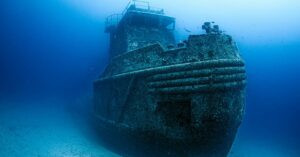
Iranian Navy Raises Capsized Frigate Sahand From Water At Port of Bandar Abbas
July 22, 2024
Fire On Maersk Frankfurt Off Karwar Coast Contained After 24 Hours, 1 Crew Missing
July 22, 2024

A new initiative has been launched to reduce harmful pollution from the hazardous remnants of shipwrecks in the Baltic Sea.
The three-year BALTWRECK initiative, which began in July, aims to reduce pollution caused by leaking fuel, ammunition, and other shipwreck debris.
The project’s total budget is EUR 3.83 million, and the European Regional Development Fund, through the Interreg South Baltic Programme, contributes EUR 3.06 million.
The Institute of Fluid-Flow Machinery of the Polish Academy of Sciences (IMP PAN) coordinates the BALTWRECK project, which includes 14 partners from four Baltic countries: Germany, Lithuania, Poland, and Sweden.
Dr. Michael Silarski supervises the Faculty of Physics, Astronomy, and Applied Computer Science at Jagiellonian University.
Dr Silarski and his team are assigned to develop and test new methods for detecting hazardous materials at sea.
The main objective of the project, which is officially titled “Prevention of Massive Chemical Pollution of Marine Waters from Leaking Wrecks and Ammunition/Weapons Dumps in the Southern Baltic Sea”, is to develop effective wreck management techniques.
These strategies will be demonstrated and used to reduce pollution from hazardous substances.
The project’s goal is to provide advanced technology for assessing wrecks and identifying and removing hazardous substances.
One of the most innovative technologies being studied is a non-invasive sensor that detects harmful substances in the aquatic environment.
Dr. Silarski developed the sensor with a grant from the Foundation of Polish Science’s FIRST TEAM initiative. It uses neutron activation to identify items’ chemical composition remotely.
The method, unlike older procedures, offers safe and precise identification of harmful substances without risking human health.
The BALTWRECK project will test these technologies in controlled environments, most likely in a port basin, in collaboration with Petrobaltic. These methods will be tested and refined in at least three pilot locations.
An important aspect of the project is the study of the impact of sunken ammunition and hydrocarbon deposits on marine ecosystems.
According to researchers, there are over 20,000 known military and civilian shipwrecks at the bottom of the Baltic Sea, with roughly 10% leaking pollutants such as carcinogenic pyrolytic oil.
Reference: Jagiellonian University
New Initiative Launched To Combat Baltic Sea Pollution From Hazardous Remnants Of Shipwrecks appeared first on Marine Insight – The Maritime Industry Guide
Source: Maritime Shipping News


